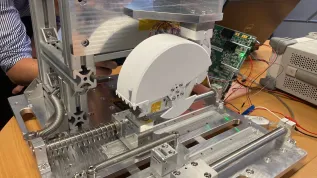
Finding the funds to support research infrastructure, such as the SOLARIS synchrotron, is problematic - admitted on Tuesday Deputy Minister of Science Piotr Dardziński. He noted that there were intense efforts to solve this problem.
Włodzimierz Bernacki (PiS) drew attention to the problems with the financing of Kraków synchrotron SOLARIS at the Jagiellonian University on Tuesday in the parliament. In his opinion for the year 2016 "there is not a single penny for the operation of the synchrotron". He asked whether the Ministry of Science and Higher Education would be ready to finance the facility - and other such large investments, "which, without further funds can be regarded as non-existent or shut down".
As announced at the synchrotron website, the cost of this project amounted to 199 million zlotys (ca. 47 million euros). The project was financed by the European Regional Development Fund under the Innovative Economy Operational Programme 2007-2013.
Undersecretary of State in the Ministry of Science, Piotr Dardziński said that indeed there were problems with finding funds for maintenance of this large infrastructure. "It\'s a classic example of a situation where a highly sophisticated research infrastructure has been built, while long-term plans do not provide sufficient resources to maintain it" - he said.
He noted that intensive efforts were made at the ministry to prepare a strategic, system solutions for synchrotron, as well as other important investments of this type. "It would be foolish on our part to have invested billions of euros and today be forced to close facilities that in the future could bring large economic benefits" - he said.
He noted that the Ministry of Science was working not only on immediate relief for the synchrotron, but also solving the problem in the long term. He noted that the decision on how to solve this problem, should be taken in 2-3 weeks.
Włodzimierz Bernacki also asked in the parliament about how the government would wants to implement a policy of innovation.
Piotr Dardziński admitted that the first objective of the Ministry of Science was to facilitate the regulations. They should enable researchers and universities to commercialise their inventions more quickly. He noted that the ministry would also provide systemic support for institutions that aid the commercialisation - technology transfer centres and SPVs established by universities. Among the solutions of which the deputy minister mentioned was also the proposal that students should have a greater opportunity to participate in research at universities.
Dardziński also noted that the Ministry of Science would actively participate in the work of the interdepartmental team appointed by the Council of Ministers to enable efficient solutions for innovation.
PAP - Science and Scholarship in Poland
lt/ je/ zan/
tr. RL













